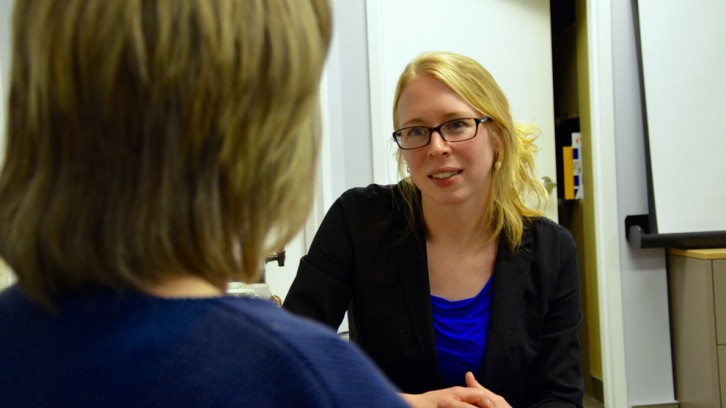Health
Hospital sees more people interested in genetic cancer testing
Increase in referral volumes has been observed since actress Jolie’s 2013 article

caption
Lauren Currie is a genetic counsellor at Maritime Medical Genetic Services, IWK Health Centre.
caption
Lauren Currie is a genetic counsellor at Maritime Medical Genetic Services, IWK Health Centre.Tracy Gatis was diagnosed with breast cancer last summer. Having undergone surgery, chemo and radiation, she began thinking ahead about how her disease could affect her two daughters in the future — especially since her two sisters and her niece also had it.
She recalled information she had seen on television and social media around four years ago about genetic testing for cancer and decided to look into it.
“I just felt like if we could get it determined if it was genetic, then perhaps we could make some different decisions moving forward about their own health care,” said Gatis.
Gatis began the process of getting tested for the genes most commonly associated with breast and ovarian cancer. After being referred to the clinic, it was decided that her niece, who was the youngest member in her family to be diagnosed with breast cancer, would be the best reflection of the family’s genes. Her niece’s test came back negative, meaning that, genetically speaking, Gatis is not at risk.
Lauren Currie, a genetic counsellor with the Maritime Medical Genetic Services at the IWK Health Centre, has observed a particular influx of patient referrals because of what she calls “the Angelina Jolie effect.”
In May 2013, actress Angelina Jolie wrote an article for the New York Times revealing that she possessed BRCA1 — a gene known to increase the risk of developing breast or ovarian cancer. Her resulting choice was to have a preventative double mastectomy.
Maritime Medical Genetic Services sees a range of patients from Nova Scotia, New Brunswick and Prince Edward Island. Since 2013, Currie claims there has been a 79 per cent increase in referrals for people interested in genetic testing.
However, this does not mean everyone interested in being tested is seen. For each referral, personal and family history of cancer is assessed. Depending on the outcome of the assessment, the person is put on a waitlist, offered an appointment or rejected. An alternate family member can be suggested for testing. In order to work with the high volumes, staff are sending out letters to those who do not meet the referral criteria or those who do not appear at risk based on the initial assessment.
“We didn’t use to do that. We used to see every person that was referred in,” says Currie. “But that would mean that people were waiting on our lists to see us for two to three years, or waiting for a phone call.”
For Currie and her team, the screening system has become an important step in trying to minimize wait times.
“In the ideal world we would have the opportunity and time to chat with everyone who’s asking a question about hereditary cancer because it’s still a worthwhile conversation but we just don’t have the resources to do that,” she says.
Although urgent cases are usually seen as quickly as possible, wait times for routine patients have been affected by high volumes. There has not been an equivalent staff increase for the number of cases being seen.
The chart below refers to the visits to Maritime Medical Genetics Services in 2012 versus 2014.
Potential for expansion of genetic test options
BRCA1 and BRCA2 are the genes most commonly tested for when looking at the likelihood of hereditary breast and ovarian cancer. Other genes have been linked to hereditary cancers, but medical opinion is less concrete regarding whether they pose an actual threat, according to Currie.
The hereditary cancer service is now considering offering a panel of genetic tests — but it is not yet guaranteed.
“The rationale behind that is we just want to make sure that we are doing the best by our patient,” says Currie. “That involves making sure that we are offering the most appropriate test that is going to give the patient as much useful information as possible while minimizing the potential for unnecessary information that can potentially muddy the waters.”
“That’s really the fundamental bottom line: it’s not just ‘oh, this is available now, we can do it —- no problem’. It’s a very thoughtful process that our team and most teams go through when they think about making major changes to how they provide health care to their patients.”
About the author

Linea Volkering
Honours Journalism/French major, Film Studies minor.
